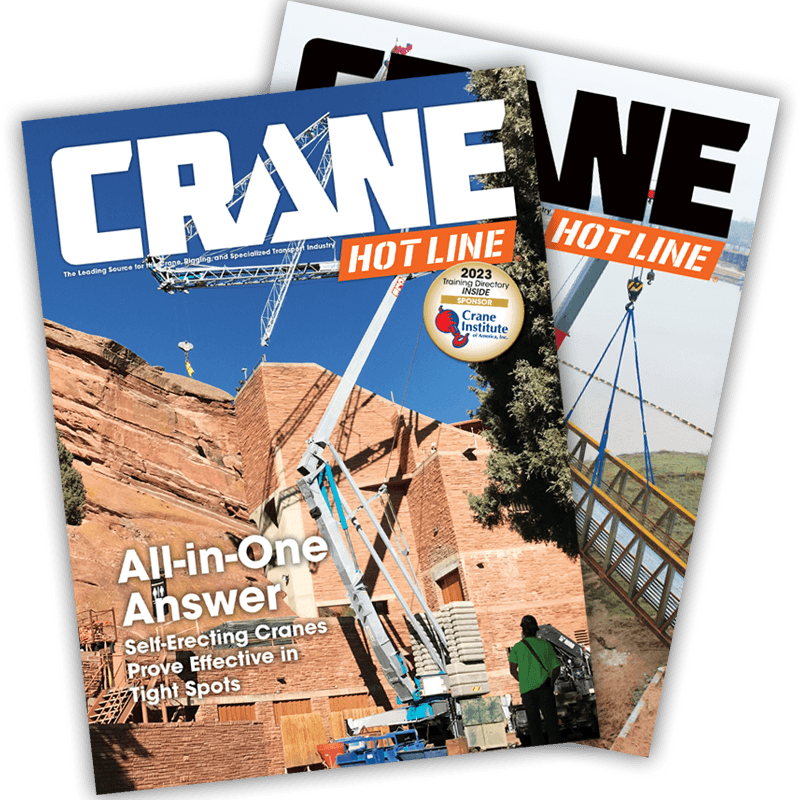First forklifts, now cranes?
Graham Brent is the Executive Director of the National Commission for the Certification of Crane Operators (CCO), an independent, not-for-profit organization formed to develop performance standards for safe crane operation. For more information, go to www.nccco.org .
March 16, 2004 -Question: Does OSHA require forklift operators to be certified? If you believe the answer is "Yes," this article is for you.
Qualifying operators for many types of equipment is high on the radar of many employers these days; and the terms "licensing," "certification," and "accreditation" are being bandied about with unprecedented vigor. But along with all the talk comes more than a dash of confusion about what these terms actually mean. Take "licensing" for example.
Licensing (or "licensure") is the most restrictive of the various forms of what is known as "credentialing," i.e. the process of granting or gaining a "credential." It generally refers to the mandatory governmental requirement necessary to practice in a particular profession or occupation, and usually includes an examination, sometimes in addition to completion of appropriate training and/or experience.
"Certification," on the other hand, is usually a voluntary process instituted by a non-governmental agency in which individuals are recognized for their knowledge and skill. Certification only becomes mandatory if it is adopted by a state entity as the basis of a licensing program (such as the CCO crane operator certification program in New Jersey ) or if an employer or project owner requires it as a basis for employment.
However, for certification to be effective, it should meet rigorous industry standards, and that is where our third term, "accreditation," comes in. In an effort to hold those who issue certifications accountable, independent third-party organizations such as the National Commission for Certifying Agencies (NCCA) and the American National Standards Institute (ANSI) have developed standards (or, in the case of ANSI, adopted an international ISO standard) for the development, administration, and ongoing monitoring of the examinations they administer. Certifying organizations who meet these standards, after an exhaustive review of their governance structure and an audit of their methodology, are "accredited" to conduct their activities.
Through this process, examinations are scrutinized to ensure they are valid and reliable, that they are administered and scored appropriately, and that due process has been used in their development and continued revision. After all, if certifying organizations themselves are not held accountable to third-party organizations, how can an employer have confidence that the credentials an individual carries are meaningful . . . as well as legally defensible in a court of law?
Given their specific definitions, misunderstanding of these terms only serves to muddy the waters. Some unfortunate examples follow: the state of West Virginia , which requires crane operators to have "mandatory certification" (an oxymoron); IPAF importing its aerial access equipment operator "license," or (and this brings us back to our first example) a belief that OSHA requires forklift operators to be "certified." Actually, what OSHA does require an employer to do [29 CFR 1910.178(I)(6)] is to "certify" (i.e. attest) that an employee has been trained in the operation of a forklift and, even though this must include an evaluation component, it is a long way from "accredited certification" as we have seen defined above.
But this, incidentally, is exactly what OSHA has proposed crane operators should have in a draft regulation now being considered by the Cranes and Derricks Advisory Committee. C-DAC is meeting monthly within an aggressive (12-18 month) timeframe using the negotiated rulemaking method of standards development to revise subpart N of OSHA's Construction Regulations. Their most recent meeting concluded March 4. If adopted (and the debate is far from over), most crane operators would need to be certified by a third-party entity (i.e. not their employer) that has been accredited to conduct personnel certifications.
In summary, then, it's clear that a sound knowledge and disciplined use of all this terminology will serve to avoid confusion and provide a clear understanding of an employer's obligations to qualify his employees on cranes, aerial lifts, forklifts or any other type of equipment that has the potential to damage, injure or kill in the hands of an unqualified operator.

CCO Update
The following news items are excerpted from the Winter 2003 edition of CCO Update , a newsletter produced by The National Commission for the Certification of Crane Operators.
New Jersey Adopts CCO Program
Under provisions signed into law last September, mobile crane operators in New Jersey will need to be certified by NCCCO (or an equivalent body accredited by NCCA) by April 2004.
In addition to being CCO-certified, operators must be at least 18 years of age, have at least 1,000 hours of crane-related experience, maintain a current medical examiner's certification card, and pay the appropriate license fee in order to be issued a state license.
A crane operator's license is valid only in conjunction with a current certification, and only in the specialties for which the crane operator is certified.
Specialties recognized by the state are: lattice boom crawler crane, lattice boom truck crane, telescopic boom cranes with a capacity of more than 17.5 tons and telescopic boom cranes with a capacity of less than 17.5 tons.
Crane operators currently holding New Jersey "long boom" licenses will need to become licensed once their current license expires.
NCCCO Expands Program to Include Tower, Overhead Cranes
The National Commission for the Certification of Crane Operators has announced plans for the development of two new crane operator certification programs. The new programs will address overhead crane operators and tower crane operators.
Development of the overhead crane operator certification program will be a collaborative effort with the Crane Manufacturers Association of America (CMAA). NCCCO will model the new programs on its existing mobile crane operator certification program. Among the certification requirements that will be considered are written and practical exams, physical (medical) requirements, experience, and recertification requirements.
NCCCO's Overhead Crane Task Force is co-chaired by John Alexander of Cranetex and Peter Kerrick of Morris Material Handling. The Tower Crane Task Force is chaired by David Ritchie of The St. Paul Companies.
American Subcontractors Association Endorses CCO Program
The American Subcontractors Association (ASA) has endorsed NCCCO's crane operator certification program.
"ASA believes that NCCCO's crane operator certification program offers excellent professional development recognition to specialty trade contractors and employees who work with cranes," said 2002-2003 ASA President Ann Bigane Wilson, president of Bigane Paving Company, Chicago, Ill.
ASA's Task Force on Professional Development, headed by Pem Eberlein of A.P. Eberlein Company, Longmont , Colo. , studied and recommended ASA's endorsement.
"NCCCO's certification program exemplifies the high standards the task force wants to see in construction certification programs, as it is non-governmental, comprehensively tests the skills required, and is administered independently of training," said Eberlein.
March 16, 2004 -Question: Does OSHA require forklift operators to be certified? If you believe the answer is "Yes," this article is for you.
Qualifying operators for many types of equipment is high on the radar of many employers these days; and the terms "licensing," "certification," and "accreditation" are being bandied about with unprecedented vigor. But along with all the talk comes more than a dash of confusion about what these terms actually mean. Take "licensing" for example.
Licensing (or "licensure") is the most restrictive of the various forms of what is known as "credentialing," i.e. the process of granting or gaining a "credential." It generally refers to the mandatory governmental requirement necessary to practice in a particular profession or occupation, and usually includes an examination, sometimes in addition to completion of appropriate training and/or experience.
"Certification," on the other hand, is usually a voluntary process instituted by a non-governmental agency in which individuals are recognized for their knowledge and skill. Certification only becomes mandatory if it is adopted by a state entity as the basis of a licensing program (such as the CCO crane operator certification program in New Jersey ) or if an employer or project owner requires it as a basis for employment.
However, for certification to be effective, it should meet rigorous industry standards, and that is where our third term, "accreditation," comes in. In an effort to hold those who issue certifications accountable, independent third-party organizations such as the National Commission for Certifying Agencies (NCCA) and the American National Standards Institute (ANSI) have developed standards (or, in the case of ANSI, adopted an international ISO standard) for the development, administration, and ongoing monitoring of the examinations they administer. Certifying organizations who meet these standards, after an exhaustive review of their governance structure and an audit of their methodology, are "accredited" to conduct their activities.
Through this process, examinations are scrutinized to ensure they are valid and reliable, that they are administered and scored appropriately, and that due process has been used in their development and continued revision. After all, if certifying organizations themselves are not held accountable to third-party organizations, how can an employer have confidence that the credentials an individual carries are meaningful . . . as well as legally defensible in a court of law?
Given their specific definitions, misunderstanding of these terms only serves to muddy the waters. Some unfortunate examples follow: the state of West Virginia , which requires crane operators to have "mandatory certification" (an oxymoron); IPAF importing its aerial access equipment operator "license," or (and this brings us back to our first example) a belief that OSHA requires forklift operators to be "certified." Actually, what OSHA does require an employer to do [29 CFR 1910.178(I)(6)] is to "certify" (i.e. attest) that an employee has been trained in the operation of a forklift and, even though this must include an evaluation component, it is a long way from "accredited certification" as we have seen defined above.
But this, incidentally, is exactly what OSHA has proposed crane operators should have in a draft regulation now being considered by the Cranes and Derricks Advisory Committee. C-DAC is meeting monthly within an aggressive (12-18 month) timeframe using the negotiated rulemaking method of standards development to revise subpart N of OSHA's Construction Regulations. Their most recent meeting concluded March 4. If adopted (and the debate is far from over), most crane operators would need to be certified by a third-party entity (i.e. not their employer) that has been accredited to conduct personnel certifications.
In summary, then, it's clear that a sound knowledge and disciplined use of all this terminology will serve to avoid confusion and provide a clear understanding of an employer's obligations to qualify his employees on cranes, aerial lifts, forklifts or any other type of equipment that has the potential to damage, injure or kill in the hands of an unqualified operator.
CCO Update
The following news items are excerpted from the Winter 2003 edition of CCO Update , a newsletter produced by The National Commission for the Certification of Crane Operators.
New Jersey Adopts CCO Program
Under provisions signed into law last September, mobile crane operators in New Jersey will need to be certified by NCCCO (or an equivalent body accredited by NCCA) by April 2004.
In addition to being CCO-certified, operators must be at least 18 years of age, have at least 1,000 hours of crane-related experience, maintain a current medical examiner's certification card, and pay the appropriate license fee in order to be issued a state license.
A crane operator's license is valid only in conjunction with a current certification, and only in the specialties for which the crane operator is certified.
Specialties recognized by the state are: lattice boom crawler crane, lattice boom truck crane, telescopic boom cranes with a capacity of more than 17.5 tons and telescopic boom cranes with a capacity of less than 17.5 tons.
Crane operators currently holding New Jersey "long boom" licenses will need to become licensed once their current license expires.
NCCCO Expands Program to Include Tower, Overhead Cranes
The National Commission for the Certification of Crane Operators has announced plans for the development of two new crane operator certification programs. The new programs will address overhead crane operators and tower crane operators.
Development of the overhead crane operator certification program will be a collaborative effort with the Crane Manufacturers Association of America (CMAA). NCCCO will model the new programs on its existing mobile crane operator certification program. Among the certification requirements that will be considered are written and practical exams, physical (medical) requirements, experience, and recertification requirements.
NCCCO's Overhead Crane Task Force is co-chaired by John Alexander of Cranetex and Peter Kerrick of Morris Material Handling. The Tower Crane Task Force is chaired by David Ritchie of The St. Paul Companies.
American Subcontractors Association Endorses CCO Program
The American Subcontractors Association (ASA) has endorsed NCCCO's crane operator certification program.
"ASA believes that NCCCO's crane operator certification program offers excellent professional development recognition to specialty trade contractors and employees who work with cranes," said 2002-2003 ASA President Ann Bigane Wilson, president of Bigane Paving Company, Chicago, Ill.
ASA's Task Force on Professional Development, headed by Pem Eberlein of A.P. Eberlein Company, Longmont , Colo. , studied and recommended ASA's endorsement.
"NCCCO's certification program exemplifies the high standards the task force wants to see in construction certification programs, as it is non-governmental, comprehensively tests the skills required, and is administered independently of training," said Eberlein.


